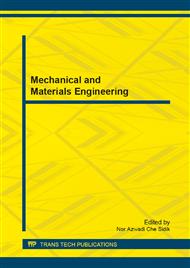p.3
p.7
p.12
p.17
p.22
p.27
p.32
p.37
Effect of Salicylic Acid / Ethanol Treatment on Tensile Properties and Morphology Analysis of Recycled High Density Polyethylene / Wood Fiber Composites
Abstract:
The effect of salicylic acid as a coupling agent on the tensile properties, and morphology analysis of recycled high density polyethylene/wood fiber (rHDPE/WF) composites were studied. Both composites rHDPE/WF and rHDPE/WFM (treatment with salicylic acid) were prepared using Brabender Plasticorder at temperature of 160°C and rotor speed of 50 rpm. The result indicated that rHDPE/WFM composites with salicylic acid exhibit higher tensile strength and modulus of elasticity but lower elongation at break than rHDPE/WF composites. The SEM micrographs showed that the wood fiber was more widely dispersed in the rHDPE matrix with addition of ethyl salicylate than rHDPE/WFM.
Info:
Periodical:
Pages:
17-21
DOI:
Citation:
Online since:
June 2014
Authors:
Price:
Сopyright:
© 2014 Trans Tech Publications Ltd. All Rights Reserved
Share:
Citation:


